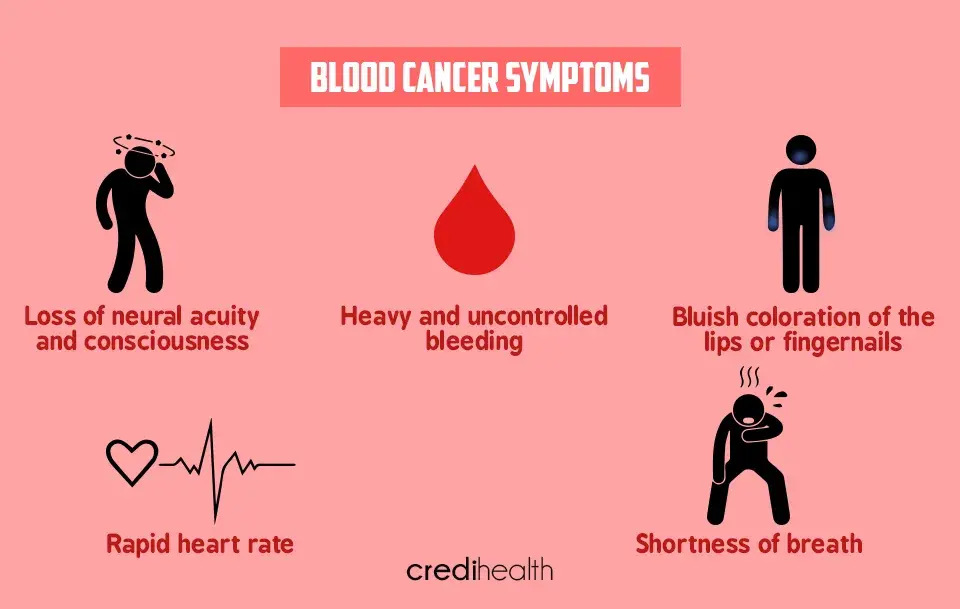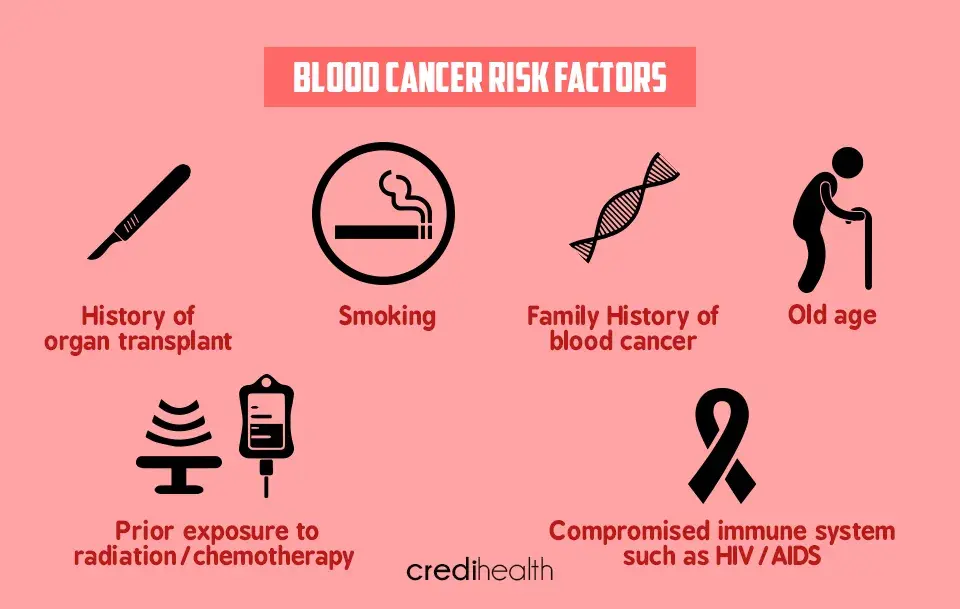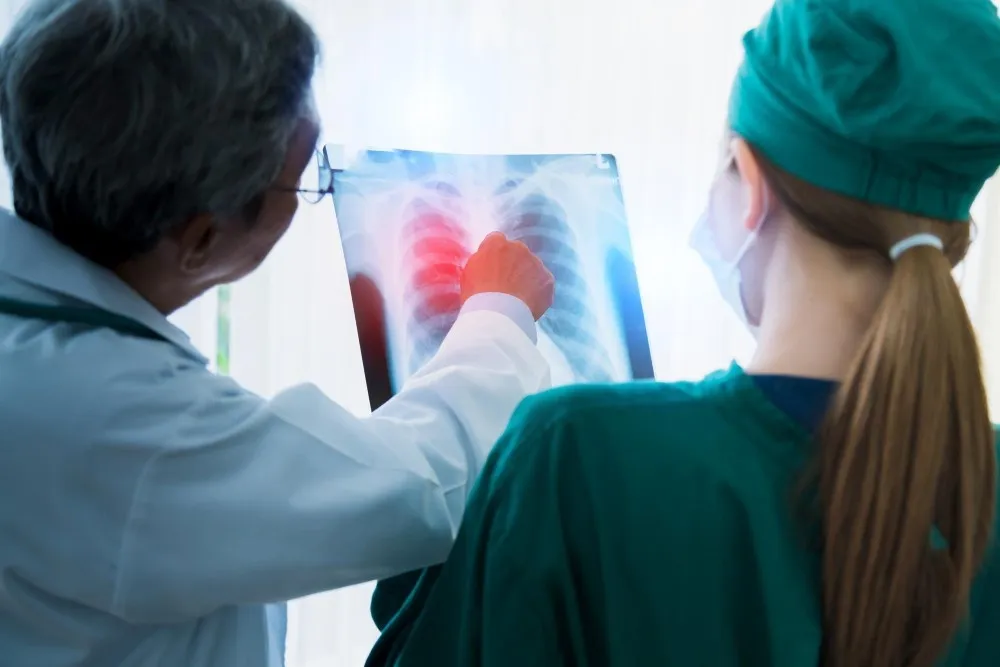Blood cancer is a broader term related to cancers that directly attack the blood, bone marrow and lymphatic system. There are three blood cancer types, namely, leukemia, which happens due to uncontrolled production of abnormal white blood cells, lymphoma affects the lymphatic system, and myeloma, which is a cancer of the plasma cells, which help in antibody formation. Based on blood cancer types, stages and blood cancer symptoms, blood cancer treatment is undertaken. In case one observes any risk factor one should immediately visit the doctor ( Best Blood Cancer Hospital in India ).
Blood Cancer Types
-
Leukemia: Out of all the blood cancer types this is one of the most common types of blood cancer. In this blood cancer types, an unusually high number of immature white blood cells are produced which are accumulated in your bone marrow blocking it and stopping it from making red blood cells and platelets which are very necessary for a balanced immune system and healthy blood. There are two categories of leukemia: Acute leukemia which develops very suddenly and it should be treated on an urgent basis; Chronic leukemia progresses more slowly, over months or years. There are four main types of leukemia:
- Acute myeloid leukemia (AML): It's most common in people over 70, although people of any age can get it.
- Acute lymphoblastic leukemia (ALL): This is the most common type of leukemia in children. About half the cases are in adults and half in children.
- Chronic myeloid leukemia (CML): It's also quite a rare condition, only about 700 people every year are affected.
- Chronic lymphocytic leukemia (CLL): Doctors diagnose just over 3,400 people with CLL a year. It's more common to get it if you're over 60 and is very rare in people under 40.
-
Lymphoma: There are 3 types of blood cancer, wherein lymphoma is one. This blood cancer types attacks your lymphatic system, which is responsible to protect your body from infection and disease, thus forms an important part of your immune system. In Lymphoma, there is unusually high growth of lymphocytes, a type of white blood cell. These lymphocytes tend to live longer than they should and this excessive amount of lymphocytes compromises your immune system. Lymphoma affects various organs of your body including your lymph nodes, bone marrow, blood, spleen and other organs.The two main types of lymphoma are:
- Non-Hodgkin lymphoma (NHL): Most lymphomas are NHL. It's more common in older people - around 50% of people diagnosed with NHL are over 70.
- Hodgkin lymphoma (used to be called Hodgkin disease): This is less common and around 1,900 people a year are diagnosed with Hodgkin lymphoma. Hodgkin lymphoma can develop at any age, but it's most common in young adults and in older men and women.
- Myeloma: Myeloma affects plasma cells which are found in the bone marrow and are responsible to produce antibodies to fight infection. In this types of blood cancer, the growth of abnormal plasma cells in bone marrow is unusually high which restricts the production of antibodies which is very important to our immune system
Blood Cancer Stages
On the basis of metastasis, stages are classified. They can be determined as per blood cancer symptoms and the rate There are different scales to determine different stages, according to the symptoms and metastasis growth. Metastasis happens when cancer spreads from one organ to another organ which is not directly connected to it. The blood cancer curable depending on condition of the patients. Mainly the stages of cancer have been divided into four parts:
- Stage 1 In this lymph nodes are enlarged due to the sudden increase of the number of the lymphocytes. This stage is less risky and curable as compared to others as the metastasis growth is not completely started at this stage.
- Stage 2 In this, organ-like spleen, liver and lymph nodes get enlarged. Not all organ are affected at the same time but one of these organs are attacked for sure.
- Stage 3 During this stage, the patient develops anaemia and organs like spleen, liver and lymph nodes are affected. In this more than two organs are affected for sure.
- Stage 4 This is the last stage in which the probability of fatality is very high as blood platelets tend to decrease very fast. In this lungs as well as other vital organs are also affected by the cancerous cells.
Blood Cancer Symptoms
 While there might be few common blood cancer symptoms, few would be specific to the type and might act as hallmark The general blood cancer symptoms usually manifest in the form of fever, chills, constant fatigue, nausea and vomiting. Cancer is remarkably noted with an unexplained weight loss with severe loss of appetite. Headaches and shortness of breaths are also common and frequent infections reflect the overall decrease in body immunity. Easy bleeding or bruising is the hallmark of blood cancer, along with other blood cancer symptoms, should warrant an immediate meeting with a physician.
While there might be few common blood cancer symptoms, few would be specific to the type and might act as hallmark The general blood cancer symptoms usually manifest in the form of fever, chills, constant fatigue, nausea and vomiting. Cancer is remarkably noted with an unexplained weight loss with severe loss of appetite. Headaches and shortness of breaths are also common and frequent infections reflect the overall decrease in body immunity. Easy bleeding or bruising is the hallmark of blood cancer, along with other blood cancer symptoms, should warrant an immediate meeting with a physician.
Common Blood Cancer Symptoms include:
- Fever, chills
- Persistent fatigue, weakness
- Loss of appetite, nausea
- Unexplained weight loss
- Night sweats
- Bone/joint pain
- Abdominal discomfort
- Headaches
- Shortness of breath
- Frequent infections
- Itchy skin or skin rash
- Swollen lymph nodes in the neck, underarms, groin
However few side effects help the physician identify the subtype of this cancer:
Blood cancer symptoms that indicate leukemia
Acute leukemia is represented by an acute destruction of RBCs, which lead to blood loss causing anaemia, weakness and extreme fatigue.
Blood cancer Symptoms that indicate lymphoma
Swollen lymphatic nodes associated with little or no pain are characteristic of this type of cancer.
Blood cancer Symptoms that indicate myeloma
Its initial stages usually go unnoticed with not many blood cancer symptoms, followed up by the routine symptoms of prolonged fatigue, frequent infections, and breathlessness. Long term blood cancer symptoms might involve kidney problems associated with it further validated with blood tests that showcase abnormal clusters of plasma cells.
There might be some blood cancer Symptoms that might want immediate medical attention, these include:
- Heavy and uncontrolled bleeding
- Loss of neural acuity and consciousness facing stages of delirium, lethargy, unresponsiveness, seizure
- Bluish coloration of the lips or fingernails
- Severe pain in abdomen and or chest with shortness of breath
- Rapid heart rate
Risk Factors
 The factors that might increase the risk of developing this cancer
The factors that might increase the risk of developing this cancer
- Old age
- Family History
- Prior exposure to radiation/chemotherapy or cancer-causing substances & chemicals
- Compromised immune system due to such conditions as HIV/AIDS, taking corticosteroids, or organ transplant
- HIV/AIDS
- History of organ transplant
- Smoking
Blood Cancer Treatment Options
 Depending on the blood cancer types and stage, a trusted oncologist like- icrmc.org would advise the patient varied for blood cancer treatment options but all of them aim to permanently cure cancer or cause disease remission.
Depending on the blood cancer types and stage, a trusted oncologist like- icrmc.org would advise the patient varied for blood cancer treatment options but all of them aim to permanently cure cancer or cause disease remission.
- Biological Therapy It helps target the cancer cells directly or indirectly stimulate the immune system to act against cancer cells.
- Chemotherapy Chemotherapy involves administering drugs that specifically treat cancer, and might involve single drug or many drugs in combination, depending on the stage. It facilitates remission and well as delays progression of blood cancer. Chemotherapy is non-selective and might kill both healthy and cancer cells, which eventually causes side effects like nausea, tiredness and hair loss. Chemotherapy also acts as a prelude to bone marrow/stem cell transplant.
- Radiation Therapy Radiation therapy delivers high-energy X-rays to targeted areas to kill cancer cells. Crucial to the success of radiation therapy is targeting the right amount of radiation at the right area of the body.
- Stem Cell Transplant Also referred to as bone marrow transplant, it helps in replacing unhealthy blood-forming cells with healthy cells. It is usually advised when all the preliminary treatment options are no longer suitable for treating the patient. It involves administering very large doses of chemotherapy or radiation therapy to kill stem cells in the bone marrow. Healthy cells from the donor then replace these.
Alternative Blood Cancer Treatment Options

- Acupuncture This blood cancer treatment procedure involves the use of fine, sterile needles which are applied to specific areas of the body. Acupuncture helps the patients to address the side effects of the cancer therapies. It helps in managing pain, nausea, vomiting, fatigue, neuropathy, anxiety, depression, and sleeping problems.
- Massage Therapy The benefits extended are similar to acupuncture. These are by a qualified and certified massage therapist, specialised in handling patients with cancer.
-
Yoga It helps in potential detox getting rid of the toxin buildup during cancer therapy. Yoga poses also stimulate blood and lymphatic flow and may boost the overall immunity of the body. Along with the routine therapy that has been recommended for the patient, few complementary blood cancer treatment options might help in improving a quality of life. These include:
- Antibiotics to reduce chances of infection
- Drugs to manage nausea, vomiting & pain
- Blood transfusion to reduce blood cell counts
Curability
Researchers have come up with a remedial option in which a medication helps to hamper the release of abnormal enzymes or cells responsible for the metastasis of blood cancer. Excess of protein is also held responsible for the enlargement and increase of cancerous cells and it can be reduced as well by the researched medication. "Narayana Hrudayalaya Bangalore offers advanced cancer treatments for patients in need of specialized care."
Dr. Sunil K Gupta, Senior Consultant Speaks on Blood Cancer Treatment, Types and Symptoms in this Video.
This article was reviewed by highly experienced and renowned doctors at Aster CMI Hospital, Bangalore. Also, read about: How to Prevent Breast Cancer Naturally.

Reviewed by







